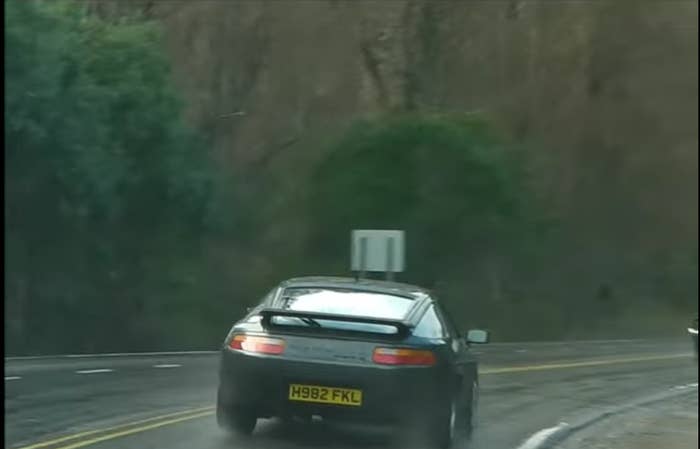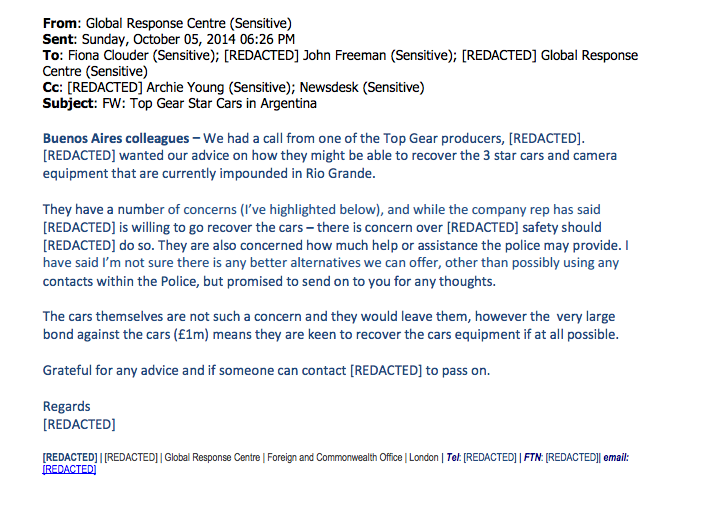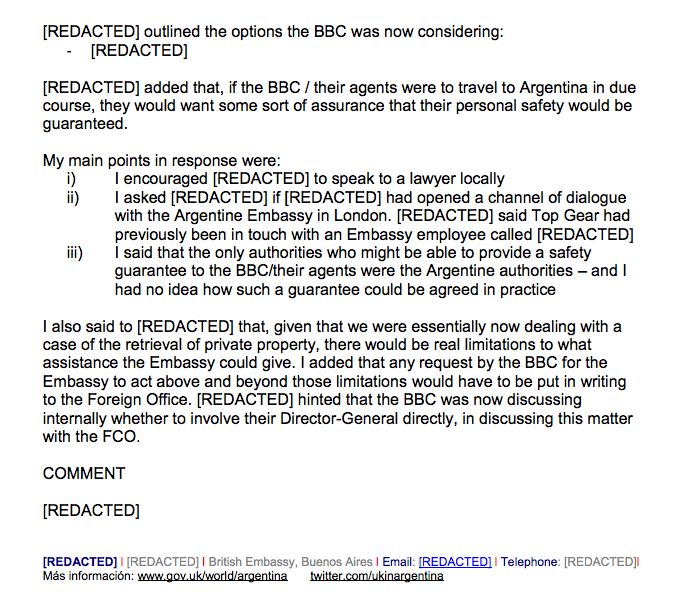The BBC's Top Gear team put pressure on the Foreign Office to help them get three abandoned cars out of Argentina following a row over a number plate, new emails reveal.

Top Gear was forced to leave Argentina in 2014 after the show's crew suffered violent attacks during filming – because the plate on Jeremy Clarkson's Porsche 928 GT appeared to refer to the 1982 Falklands war.

The crew had to abandon the cars driven by the presenters after being pelted by stones because Falkland War veterans believed Clarkson's number plate – H982 FKL – referred to the 1982 conflict.
Filming of the Christmas special was cut short and the Top Gear crew fled across the border to Chile, with the "star cars" – the Porsche, a Ford Mustang Mach 1, and a Lotus Esprit – left by the roadside. The BBC insisted Clarkson's number plate was just an "unfortunate coincidence".
Foreign Office emails from the time that have just been released under the Freedom of Information Act show how the BBC was desperate to go back and retrieve the cars and camera equipment due to a "bond" of £1 million.

This email from a Foreign Office official in London to Fiona Clouder, the British ambassador in Chile, and John Freeman, the British ambassador in Argentina, describes how a Top Gear producer sought advice as to how the BBC could recover the cars safely.
The civil servant wrote: "The cars themselves are not such a concern and they would leave them, however the very large bond against the cars (£1m) means they are keen to recover the cars [sic] equipment if at all possible."
Freeman wrote back, suggesting it's not really the Foreign Office's job to help get the BBC's cars back.

Freeman said: "This may not be easy and quite obviously it is not something this Embassy could itself effect directly. I will inquire of our consular team what we would normally do regarding lost or impounded goods (eg we may suggest a list of lawyers the BBC could consult and ask to act)."
But it seems the BBC wouldn't give up. Four days later, Freeman received another email from an official at the Buenos Aires embassy on the matter.

The diplomat said: "I just took a call from Top Gear [REDACTED]. [REDACTED] said [REDACTED] was calling to seek my private advice on a number of options the BBC was considering, for the recovery of their 3 vehicles in country."
The email also informed Freeman that the Top Gear staffer had "hinted that the BBC was now discussing whether to involve their Director-General directly, in discussing this matter with the" Foreign Office.

The official said she told Top Gear that "given that we were essentially now dealing with a case of the retrieval of private property, there would be real limitations to what assistance the Embassy could give".
The latest FOI release follows a separate tranche of Foreign Office emails on Top Gear unveiled last October.
Those emails were limited to correspondence sent only by Freeman. He told staff the BBC had been "part of the difficulty" and that there had been a "lack of information" from the corporation about what exactly it was doing in the country.
The recent FOI release involves a wider range of emails on the same topic between Foreign Office staff and the BBC.
BuzzFeed News asked the BBC whether it ever recovered the three cars from Argentina, but the corporation declined to comment.
The programme that was eventually broadcast featured a voiceover stating that the "star cars" were abandoned in Argentina near the town of Rio Grande. Asked if the cars used on camera had ever been retrieved, the BBC wouldn't comment, meaning the question of whether the £1 million bond was ever recovered remains unanswered.
